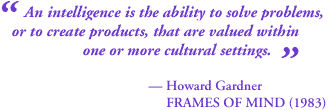



Multiple Intelligence Theory
Dr. Howard Gardner developed the multiple intelligence (MI) theory. The theory basically states multiple intelligence tests for children measure far more than an IQ test measures. MI encompasses eight areas.
Linguistic intelligence
Linguistic intelligence relates to words and/or word meanings. A child with strengths in linguistic intelligence will:
-
Remember words and meanings
-
Write poetry
-
Enjoy reading
-
Play word games
-
Put words easily into orders and patterns
Logical-mathematical intelligence
Logical-mathematical intelligence is related to numbers and/or reasoning. A child who is strong in logical-mathematical will:
-
Create mathematical sequences
-
Solve puzzles
-
Conduct experiments
-
Have an inquisitive nature
-
See patterns and relationships
Visual-Spatial intelligence
Visual-Spatial intelligence relates to space and images. Children with this skill:
-
Have a visual memory
-
Like to draw
-
Are more likely to be artists and designers
-
Learn from charts and graphs
-
Like visual puzzles
Bodily-Kinesthetic intelligence
Bodily-Kinesthetic intelligence is related to controlling body motions and manual dexterity type skills. Children with bodily-kinesthetic intelligence:
-
Work with their hands
-
Like movement
-
Act things out
-
Learn by doing
-
Like touch
Musical intelligence
Musical intelligence relates to musical skills. Children with this ability will:
-
Learn through music or rhythms
-
Create music
-
Identify with music
-
Play a musical instrument
-
Be sensitive to sounds around them
Interpersonal intelligence
Interpersonal intelligence focuses on relating to people. Children with interpersonal intelligence:
-
Can read other people and their emotions
-
Have a lot of charisma
-
Are typically leaders
-
Have a lot of friends
-
Learn through groups and interaction
Intrapersonal intelligence
Intrapersonal intelligence allows one to understand his inner world. Children with intrapersonal intelligence:
-
Prefer to work alone
-
Are usually quiet
-
Are deep thinkers
-
Like to reflect
-
Have a strong will and strong opinions
Naturalist intelligence
Naturalist intelligence relates to sensitivity toward other living things, such as animals and plants. Children with naturalist intelligence will:
-
Recognize and classify things in nature
-
Show an interest in Earth sciences
-
Enjoy being outdoors
-
Describe relationships in nature
-
Show concern for the environment
-











